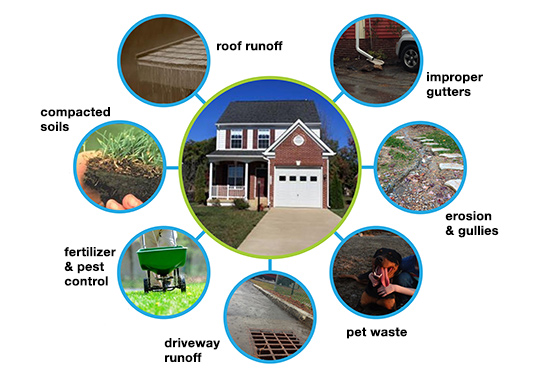Why Soak Up the Rain?
Over 90% of the water pollution problems in New Hampshire are caused by the pollutants carried in stormwater runoff from the roads we travel, the buildings and parking lots we visit, and even the homes in which we live. Small changes in the way we manage our properties can have a positive impact on the waterbodies we play in and depend on.
What You do in Your Backyard…
If your home has a roof, lawn, or driveway, chances are your property creates stormwater runoff. You can play a role in preventing water pollution by soaking up the rain to prevent it from carrying pollutants to nearby lakes, streams, and other waters. Here are some sources of runoff and pollutants we find at home:
What is Stormwater Runoff?
Stormwater runoff is water from rain or melting snow that doesn’t soak into the ground. Instead, it flows over the land surface, picks up pollutants in its path, and flows untreated into nearby bodies of water. Runoff can pollute lakes, ponds, streams, and coastal waters, making them unsafe for swimming and creating an unhealthy habitat for fish and other aquatic animals.
Common stormwater runoff problems and pollutants include:
ERODING SOILS make the water cloudy and reduces clarity. Fine sediment can clog the gills of fish and smother aquatic habitat. Over time, sediment can fill in a lake or stream, making it easier for plants, including invasive plants like purple loosestrife and exotic milfoil, to take root. Sediment also can carry other pollutants with it, including nutrients and metals.
FERTILIZER, PET WASTE AND SEPTIC SYSTEMS can contribute excess nutrients that speed up plant and algae growth, including cyanobacteria, which can harm humans and animals and be a nuisance for swimming and boating. As bacteria consume the dead plant matter, they use large amounts of oxygen, leaving less available for fish and other organisms, which can result in fish kills. Nutrients can also increase bacteria that can make swimmers sick and lead to beach closures. Bacteria not only pose a public health risk, but can also cause an economic hardship for communities that rely on bathing beaches for tourism revenue.
LAWN CHEMICALS AND AUTO CHEMICALS contain contaminants that are potentially fatal to aquatic organisms, humans and other animals.
ROAD SALT AND DEICING MATERIALS applied to roads, highways, parking lots and driveways include chloride, which increases salinity in waterbodies stressing aquatic organisms that depend on freshwater habitats. As salinity increases, freshwater plants die off and salt-tolerant plants take over. Chloride can contaminate drinking water supplies, including private wells. Unlike other pollutants, there is no treatment for chloride pollution except for reducing the amount applied.
INCREASES IN WATER TEMPERATURE can occur when stormwater runs over hot pavement or other surfaces with very little shade. This heats the runoff, which can increase the temperature of streams and ponds when the runoff enters them. Many fish and other aquatic species depend on the higher oxygen concentrations that cool water provides. Warmer water has less oxygen and makes it more difficult for fish to breathe.
